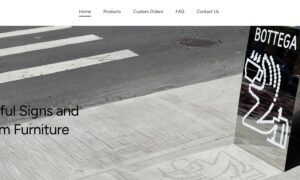As a business owner seeking to drive growth, leveraging a robust Point of Sale (POS) system can be a game-changer. POS systems like POS.cat offer essential features that can streamline your operations. These tools not only enhance efficiency but also improve the overall customer experience, making your business more competitive.
One key feature of POS systems is inventory management, which helps you keep track of stock levels in real time, reducing the chances of stockouts or overstocking.
Additionally, the employee time clock feature ensures that you have accurate records of staff hours, simplifying payroll processes.
Third-party integrations allow for seamless connectivity with other essential business applications, providing a holistic solution for your operational needs.
By incorporating a comprehensive POS system like POS.cat, you can focus on scaling your business rather than getting bogged down by administrative tasks. The right POS system in place ensures that your staff and operations run smoothly, giving you more time to strategize and grow. If you would like a free consultation about point of sale systems call 1-800-434-9026
Key Takeaways
- POS systems streamline business operations with essential features.
- Inventory management and employee time clocks enhance efficiency.
- Third-party integrations provide a cohesive operational solution.
Understanding Point of Sale Systems
Point of Sale (POS) systems are vital in modern retail for efficient transactions and inventory management. They incorporate essential hardware and software components to streamline business operations.
The Role of POS in Modern Retail
As a crucial tool, POS systems enhance retail efficiency by handling sales, tracking inventory, and managing customer relationships. By integrating various functions, they reduce the need for multiple systems.
For example, a POS system combining a card reader, barcode scanner, and cash register can simplify checkout processes.
Cloud-based and mobile POS systems, compatible with iOS and Android devices, offer flexibility, allowing you to run your business from anywhere. This modern approach to retail ensures prompt and accurate service, enhancing customer satisfaction.
Key POS System Components
A POS system comprises hardware and software to facilitate transactions. Pos hardware includes items like tablets, barcode scanners, card readers, and traditional cash registers.
Tablets, particularly those running iOS or Android, offer mobility and space savings.
POS software ensures functionality with features like inventory management and employee time tracking.
Cloud-based POS systems provide real-time updates and data access, crucial for decision-making and remote management. Integrations with third-party software extend capabilities, connecting accounting and customer relationship management systems.
Through this combination of hardware and software, a POS system delivers a multi-faceted tool essential for modern retail operations.
Features That Empower Business Operations
Incorporating a robust point of sale system can significantly enhance business efficiency through inventory management capabilities, employee time tracking, and detailed sales reporting.
Inventory Management Capabilities
A point of sale system with advanced inventory management tools helps you keep stock levels balanced and avoid shortages. Real-time tracking updates ensure you know what items are selling quickly and when to restock.
With integrated inventory management, you can set reorder alerts and generate purchase orders directly from the system. This reduces manual errors and saves time.
You can also track product locations within your store and oversee multiple warehouses.
Using these features, you can analyze inventory turnover rates and gross margins, allowing you to make informed purchasing decisions and optimize stock levels to meet customer demand efficiently.
Employee Management and Time Clock Functionality
Effective employee management is crucial for operational success. A POS system that includes a built-in employee time clock simplifies time tracking.
You can track employee hours, breaks, and overtime accurately, which ensures correct payroll processing.
With role-based access controls, you can assign permissions to staff based on their responsibilities, enhancing security and accountability. Performance insights from sales data help you evaluate individual and team productivity.
These tools also let you schedule shifts, reducing conflicts and improving labor cost management. Furthermore, you can use the time clock data to comply with labor laws and regulations, minimizing risk.
Sales Reporting and Analytics
Access to detailed sales reporting and analytics provides valuable insights into business performance.
A POS system that offers customizable reports allows you to track daily sales, identify trends, and analyze customer behavior.
With these analytics, you can identify peak sales periods and adjust inventory and staffing accordingly. This aids in strategic planning and helps optimize overall operational efficiency.
You can also review sales metrics such as average transaction value and total revenue.
Additionally, integrating third-party applications for advanced analytics offers a more comprehensive view of your business performance, enabling data-driven decisions for sustained growth.
Improving Customer Experience
Enhancing the customer experience is crucial for retaining clientele and encouraging repeat business. Key methods include building loyalty programs, offering multiple payment options, and ensuring smooth transactions both online and in-store. For a free consultation about point of sale systems call 1-800-434-9026
Building Customer Loyalty Programs
You can use customer loyalty programs to incentivize repeat business by offering perks like discounts, exclusive deals, or points that accrue with each purchase. This not only enhances customer retention but also provides valuable data on purchasing habits.
Gift cards can be integrated into the loyalty program, allowing customers to purchase for themselves or gift to others, further extending your customer base. Consistent customer support reinforces the reliability of these programs, making customers feel valued and understood.
Implementing Multiple Payment Options
Offering multiple payment options caters to the diverse needs of your customers.
In-person payments benefit from options such as contactless payment and tap to pay, ensuring quick and safe transactions.
Online payments can include credit cards, digital wallets, and even installment plans for larger purchases.
Make sure the POS system supports these varied methods smoothly. The goal is to make the transaction process as seamless as possible, reducing wait times and increasing customer satisfaction.
Fostering Smooth Online and In-Person Transactions
Transitioning between online and in-store transactions should be effortless. Your POS system must synchronize inventory levels in real-time to prevent stock discrepancies. This is crucial for online ordering and delivery services.
Clear and immediate communication with customers about their order status builds trust. In-person transactions should be swift, with well-trained staff and an intuitive POS interface reducing the likelihood of errors. A well-integrated system means fewer hiccups, better customer experiences, and ultimately, more sales.
Integration and Scalability
In this section, I will describe how integrating third-party tools can expand functionality and how scalability supports business growth across multiple locations.
Third-Party Integrations for Expanded Functionality
Integrations with third-party tools can offer a variety of features.
For instance, integrating a Customer Relationship Management (CRM) system enables you to track customer interactions and manage relationships more effectively.
Another example is integrating with accounting software like QuickBooks or Xero, which helps you streamline financial reporting and invoicing.
Inventory management integrations allow real-time tracking of stock levels. With 3rd party integrations, you can also enable online ordering, mobile payments, and marketing tools. These integrations enhance your system’s capabilities while reducing manual work.
Scalability for Multi-Location Businesses
Scalability is crucial when managing multiple locations. A scalable POS system ensures that as your business grows, your systems keep pace. This includes seamless data synchronization between locations.
Having centralized control over inventory and sales data allows you better oversight. For instance, you can monitor sales performance across different locations from one dashboard.
Multi-location features also support consistent customer experiences. Customers can earn and redeem loyalty points at any location. Scalability in a POS system means you can effortlessly expand your business without worrying about tech limitations.
Choosing the Right POS System for Your Business
Selecting the right POS system entails evaluating specific factors and analyzing options from various vendors.
Factors to Consider for Selection
When choosing a POS system, look at the types of businesses it caters to—whether it’s for retail, restaurants, or small businesses. Each industry has unique needs.
For instance, restaurant POS systems like Toast and Lightspeed Restaurant often have table management and menu customizations.
Pricing is crucial. Make sure to check not only the upfront cost but also ongoing expenses like processing fees and transaction fees.
Some providers, like Square POS, offer straightforward pricing, perfect for small business owners.
Additionally, integration capabilities matter. Evaluate if the POS can integrate with your existing tools, from accounting software to e-commerce platforms. Systems like Shopify POS and Vend excel here.
Exploring POS System Vendors and Products
Choosing the right vendor involves researching the best POS systems and what they offer.
Popular systems include Square, Lightspeed, Clover, and Revel. Each has unique strengths.
Square for Retail provides a user-friendly interface with robust inventory management.
Lightspeed Retail offers advanced reporting and customizable workflows, ideal for complex operations.
For restaurants, Toast and Lightspeed Restaurant lead with features tailored to food service businesses.
Each vendor varies in support and additional features, so I prioritize customer service and ease of use.
Vendor reputation and reliability also play a part in my decision.
Companies like Shopify, Korona POS, and Clover POS come highly recommended and are worth considering for their proven track records.
https://studio.youtube.com/video/lVNN9RgVEIQ/edit
Read More From Techbullion And Businesnewswire.com



































